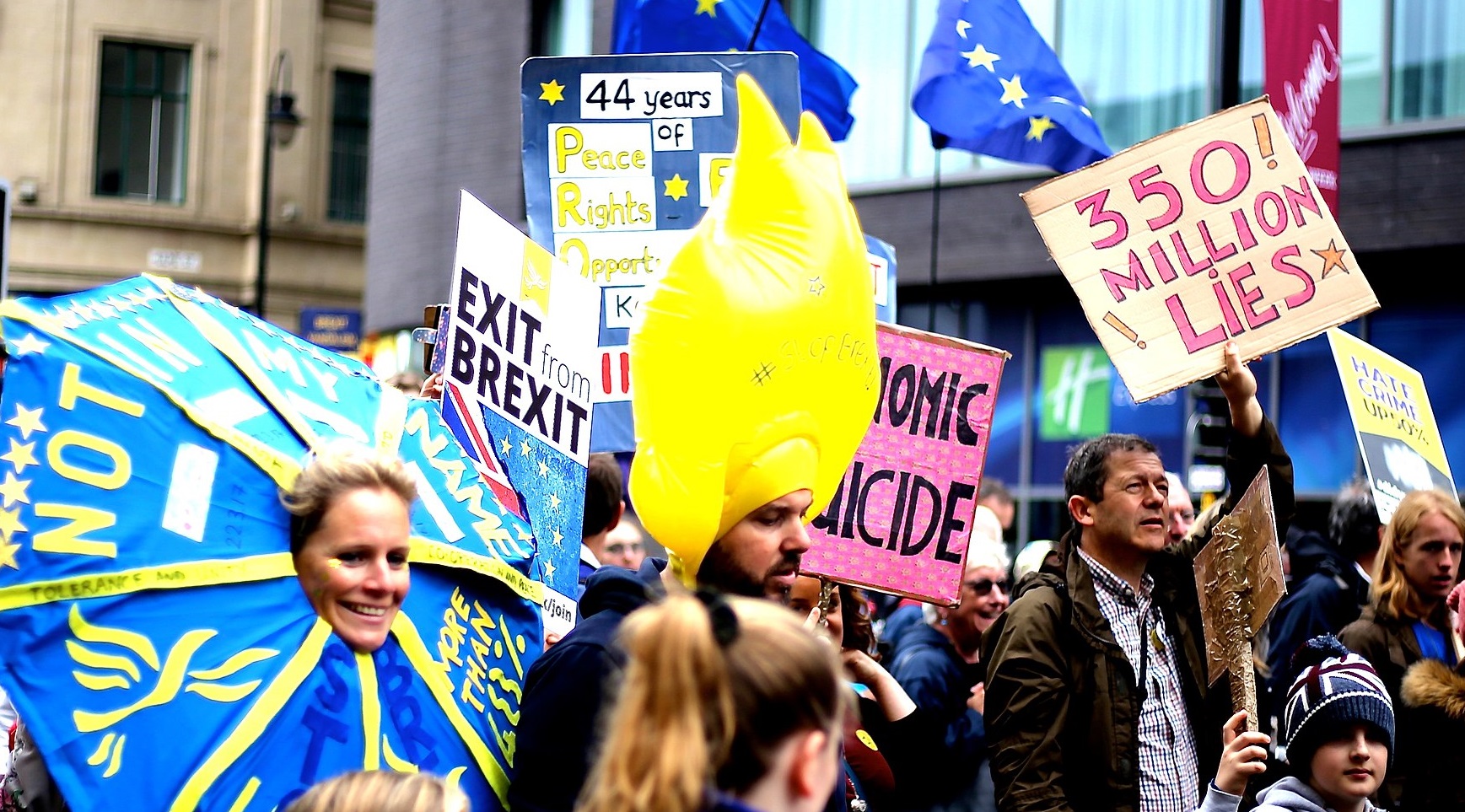(Updated 17 January 2019 following the vote in Parliament on May’s “Brexit deal” and her surviving the vote of no confidence on 16 January)
Ten weeks to Brexit. March 29, the date of UK’s exit from the EU, is closer than ever. But right now we are living through a “Brexit deadlock”. And it shows no sign of resolving: First there was the historic contrary vote in Parliament on 15 January that rejected Prime Minister May’s controversial “Brexit deal”. The margin of defeat was enormous, May lost by 230 votes. Next, on 16 January, May survived the vote of no confidence Labour Leader Corbyn had called for, with a thin majority of 19 votes.
The defeat, however predictable and expected, still managed to shock many people. And EU Commission President Juncker expressed regret:
I take note with regret of the outcome of the vote in the @HouseofCommons this evening. I urge the #UK to clarify its intentions as soon as possible. Time is almost up #Brexit https://t.co/SMmps5kexn
— Jean-Claude Juncker (@JunckerEU) January 15, 2019
The EU Commission also released a formal statement on 15 January by President Juncker highlighting that the “process of ratification of the Withdrawal Agreement continues. Because this Withdrawal Agreement (i.e. May’s “Brexit deal”) is:
“a fair compromise and the best possible deal. It reduces the damage caused by Brexit for citizens and businesses across Europe. It is the only way to ensure an orderly withdrawal of the United Kingdom from the European Union.”
The EU won’t budge on the Irish border problem. This is it – end of the road. As EU Council President Donald Tusk was quick to note , the U.K. should cancel Brexit since no better deal can be negotiated.
The problem is a political one. As Guardian’s John Henley said, ““The crux of the problem is that there is no parliamentary majority for any solution. There is no majority for May’s deal, there is no majority for no deal, there is no majority for a second referendum, and there is no majority for the various alternative deals mooted by MPs.”
The logic is to go back to the people and vote again, as suggested by Susan Wilson in her recent article on Impakter celebrating “2019: The Year We Finally Bury Brexit“. That is also what the markets expected and the pound immediately rebounded.
Unfortunately, little time is left to organize a referendum. Some people argue there’s no time left at all.
Yet a no-deal Brexit was excluded by a crucial Parliament vote on 8 January that passed almost unobserved by the mainstream media. But that vote ensured, to use Labour Leader Jeremy Corbyn’s expression, that the UK cannot “legally go crashing out” of the EU on 29 March 2019:
Taking the Pulse of the Brexit Deadlock
People are dismayed, businesses are anxious. For example, Ruth Lambert, development manager at the Federation of Small Businesses for Somerset and Wiltshire, said: “It is time for politicians to come together and urgently find a way forward from this alarming Brexit stalemate, and now, no-confidence vote. The UK is due to leave the EU in just ten weeks, and yet businesses still have no idea what kind of circumstances they should prepare for.”
In the days leading to the two devastating Parliamentary votes, panic was palpably spreading in the U.K. It was documented by the generally austere UK Guardian in a series of dramatic articles with titles like: A no-deal Brexit will kill startups, say Eco-capsule coffee firm bosses; Brexit would be similar to ‘national suicide’, says leading Tory pro-European Dominic Grieve.
Twitter is palpitating with the news. Consider this tweet from Gillian Ford, Councillor London Borough of Havering and Deputy Chair LGA Children:
Dominic Grieve QC MP suggests the PM’s Brexit deal can satisfy no one. Views are polarised. There is only one way out, by going back to the public. A no deal Brexit is political suicide. @EA_CoR @The_Convention_ pic.twitter.com/WoYeezshaM
— Cllr Gillian Ford (@CllrGillianFord) January 11, 2019
Reading posts under the hashtag #ThinkAnewActAnew that covered events at the Convention: Think Anew Act Anew, Another Vote is Possible, held in London on 11 January is an eye-opener. Organized at very short notice by activist-journalist and UK Editor of Vanity Fair Henry Porter, it shows that there is now a strong, ongoing surge of popular support for a second referendum. Green Party co-leader Caroline Lucas made a notable opening speech, reported on Channel 4 News:
“No wonder it is being called an unforgivable act of intergenerational theft.”
Green Party co-leader @CarolineLucas says more than 70 per cent of young voters backed Remain in the EU referendum – and there should be a second poll.#77DaysToBrexit pic.twitter.com/bnVhsqYvG8
— Channel 4 News (@Channel4News) January 11, 2019
Caroline Lucas underlines how Brexit was the result of a skewed “majority”, recalling that Brexit has been called an “unforgivable act of inter-generational theft”: over 70 percent of the people aged 18 to 24 voted for Britain to remain, as did 62 percent of the 25 to 34 years. Young people need to make their voice heard and be given a chance to do so. Note that nearly 50,000 people viewed the video embedded in this tweet.
The more extreme remainers have worked on building up a case that Brexit is illegal, unconstitutional because fake news and lies misdirected the voters.
The remainer side rebounded soon after the 2016 results were in and by mid-2017, polls consistently showed their numbers were ahead of Brexiteers and growing. The most recent poll (Survation 12 January 2019) confirms that remain is the preferred choice. And an ample majority would like to have a second referendum to get the people’s views (46 % support vs. 34% oppose, with 20% don’t know).
But it’s not just the remainer side that is growing. Uncertainty about what will happen after Brexit has risen to crisis proportions, especially for the Brits who live abroad across Europe.
Even those who supported Brexit with funding are having second thoughts. For example, two of the the so-called biggest “Brexit donors” told Reuters that they now believe Britain will “reverse decision to leave EU”. One is billionaire Peter Hargreaves, partner in Blue Whale Capital, co-founder of Hargreaves Lansdown, one of the UK’s largest financial services businesses. The other is veteran hedge fund manager Crispin Odey who is now backing the sterling to rise.
Yet the torment is not limited to this side of the channel. The EU is tormented too. Brexit is happening at a very bad time for Europe, increasingly struck by a growing economic malaise. Some countries are already in technical recession: Industrial production in Germany, Spain and Italy went negative in November. And a surging populist wave of nationalism is casting a threatening shadow over the EU parliament at the coming May elections. Populists make many false promises and find it hard to deliver on them, so the wave may yet prove smaller than feared, but the anxiety is there.
Add to this explosive mix, the fact that Romania which currently holds the presidency of the EU and will do so right through the March 29 Brexit date – constitutes a further threat on its own: Romania is currently in open conflict with the EU institutions. Romania, like Hungary and Poland before it, is sliding towards an “illiberal democracy”. In January 2018, the European Commission asked Romania to “rethink its judiciary laws”.
From Brexit Deadlock to What: No-deal? Delay? Brexit Cancelled? Another Referendum?
The expectation was that the 15 January vote in Parliament would put an end to the Brexit Deadlock. But with May’s deal rejected by such a large margin, every option is back on the table, from no-deal to a new referendum.
The fact that May survived the vote of no-confidence means several things: One, that the prospect of general elections is receding (Corbyn doesn’t have the votes to swing it). Two that she will need to seek bi-partisan support for whatever solution she proposes – whether to go back to the EU to try and get a “better” deal or organize a referendum.
Some believe a no-deal Brexit is very likely. They forget – or prefer to ignore – that it would be a nightmare, as this Bloomberg video amply documents in regard to food:
British farmers argue that they are not taking jobs away from British workers. They need migrant labor to pick their crops, and migrant labor, in the case of no-deal Brexit, is likely to suddenly dry up.
What is true for food is equally true for health services and medicines. The NHS is quickly running out of doctors and nurses. For example, a recent report warned that NHS nurse vacancies would top 51,000 by the end of the transition, in 2021.
More likely than a no-deal Brexit, is a delay. The European Court of Human Rights has handed down a very clear decision: The UK can cancel Brexit but delaying would require agreement from all the other 27 EU members.
Perhaps the greatest irony if there is a delay is that British MP candidates could participate in the EU Parliament May 2019 elections. If they do, and Brexit does occur within a few months or a year, then those MPs would be elected for a 3-year term in the EU Parliament while their own country is leaving or even has left Europe.
So between the option of delay and the one to cancel Brexit, there is NO QUESTION that the latter is the easier option. There is no need to convince the 27 EU members. The UK Parliament is free to cancel Brexit and do it anytime. But the numbers for that solution don’t exist – for now.
And for now, the possibility of a second referendum is also up in the air. First, it too would require a delay. Second, the current Conservative political set-up supporting May would need to change. Not likely. Meanwhile Cameron is “running away from Brexit” and disappointing everybody. Third, the Labour party needs to clarify its position. Corbyn is a notorious Euro-skeptic and would prefer a “softer deal”. By 16 January, 71 Labour MPs had declared their support for a second referendum, putting them at odds with Corbyn. But they still were not a majority.
Ultimately, Brexit is a tragedy and one that could have been avoided if the 2016 campaign had not been mired in fake news and the exploitation of people’s anger. The English comedian, writer and activist Stephen Fry summed it up brilliantly:










